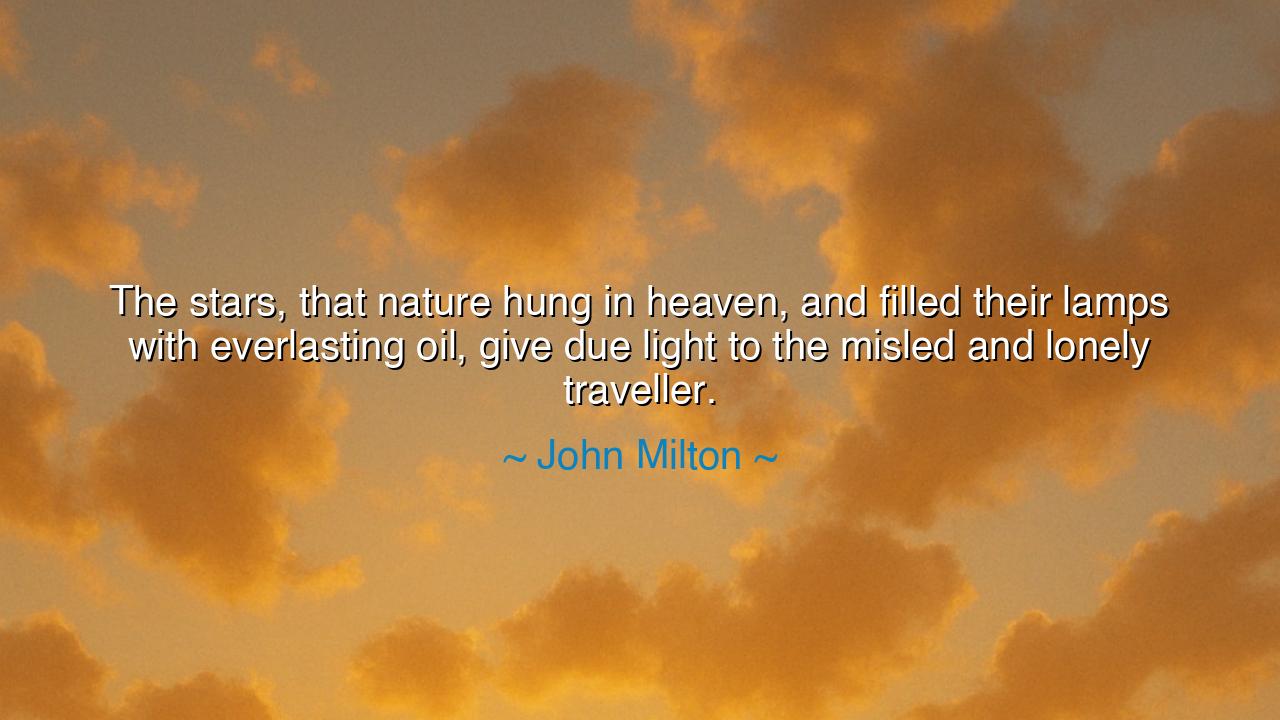
The stars, that nature hung in heaven, and filled their lamps
The stars, that nature hung in heaven, and filled their lamps with everlasting oil, give due light to the misled and lonely traveller.






In the grand sweep of the cosmos, where the heavens stretch beyond the limits of human comprehension, the stars have always been more than mere points of light in the sky. They are symbols of guidance, hope, and purpose, ancient beacons for the lost and the wandering. The poet and philosopher John Milton captured this deep truth when he said, "The stars, that nature hung in heaven, and filled their lamps with everlasting oil, give due light to the misled and lonely traveller." Milton’s words, like those of the ancient seers, remind us of the sacredness of the stars, how they not only illuminate the night but also guide the weary soul through life’s most uncertain paths.
In ancient civilizations, the stars were often revered as the eyes of the gods, watching over humankind. The Babylonians charted the stars with great precision, believing them to be divine messengers who could guide them in both earthly matters and spiritual quests. Homer in his epic works wrote of heroes like Odysseus, who found his way home not through physical maps, but by reading the constellations in the heavens, as though the gods themselves were guiding his journey. Similarly, Milton invokes the stars as eternal lights, filled with divine oil, that shine upon us in our moments of confusion and darkness, just as they did for the lost travelers of antiquity.
The ancient Greeks too believed that the stars, particularly the constellations, had specific meanings that spoke to the destiny of individuals. Ptolemy, the great astronomer, and his predecessors in Alexandria, saw the heavens as a map, where each star and constellation told a story about human fate. These stars were not just objects to be admired, but signposts, each one serving to illuminate the path for those who would seek to understand the deeper truths of the universe. In Milton’s words, these stars are not only celestial bodies but sacred lamps, filled with the light of eternal wisdom, meant to guide the misled and lonely traveller toward their ultimate destination, be it a literal journey or a spiritual quest.
Consider the example of the ancient mariners, who crossed vast oceans with nothing but the stars above them to guide their course. Magellan, Columbus, and Vasco da Gama set sail into the unknown, their ships guided by the light of the stars, just as Milton’s traveller is guided by the light of the heavens. Their journey was fraught with peril, but they relied on the stars as their navigation, trusting that the same unwavering light that had guided the ancients would also lead them to new lands and new discoveries. Just as those explorers trusted in the eternal constellations, so too does the lonely traveller find solace in the light of the stars, knowing that no matter how lost they may seem, the way forward is always there, illuminated by the wisdom of the cosmos.
But Milton’s message is not solely about the physical stars that light the night sky; it speaks to the symbolic light they represent. In times of despair, when the traveller feels misled or alone, the stars serve as a reminder of a higher purpose, of a divine order that guides us through the darkness. Just as Dante in his Divine Comedy journeys through the realms of hell, purgatory, and heaven, led by the light of reason and divine grace, so too does the traveller in life find their way through the trials of the world by turning their eyes upward, seeking guidance from the stars. They are a reminder that no journey is truly alone, that even in the deepest darkness, there is light to be found, and that light is ever present in the universe, waiting to illuminate the way forward.
In our own lives, the stars continue to serve as guides. Milton’s words remind us that even when we feel lost in the tumultuous seas of life, we can always look to the light—whether in the stars, the wisdom of our ancestors, or the inner strength that resides in each of us. The challenges we face are like the endless nights that once surrounded the ancient mariners, but if we are steadfast, we too can find our way forward by the light of these eternal stars. Space is not just a place of endless emptiness, but a source of constant guidance and inspiration, a place where wisdom flows like oil in the lamps of the heavens.
The lesson here is both practical and profound: like the travellers of old, we too must look beyond our immediate struggles and seek the guidance that is available to us from the universe, whether that guidance comes from the stars, from the teachings of those who have walked before us, or from our own inner wisdom. Let us embrace the wisdom of the stars and trust that, even in our most uncertain moments, we are never truly lost. The stars are always above us, offering light to lead the way—if only we are willing to seek them out. In every dark night, remember, the stars shine with everlasting oil, offering light to the traveller, no matter how far they may seem from their goal.






AAdministratorAdministrator
Welcome, honored guests. Please leave a comment, we will respond soon